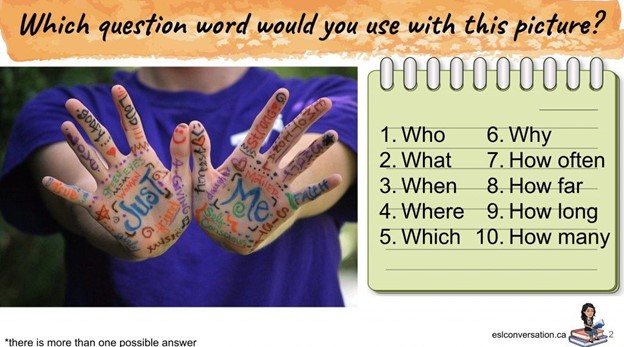ESLconversationlesson.com a Repository for English Conversation Activities
| This article was first published in September 2020, and updated in December 2021. |
Teaching conversational English may seem like an easy endeavor but coming up with good conversation starters and being able to keep the conversation going are among the most challenging aspects of teaching ESL.
Like many ESL teachers, Mélanie Sisley kept her favorite conversation activities in files here and there on her computer. Finding just the right topic to engage students and spur conversation became increasingly difficult as the number of files multiplied. That”s when she decided to make a website to collect and curate speaking activities for ESL conversation. On eslconversationlesson.com, Mélanie Sisley generously shares resources that CEGEP ESL teachers can use to help students improve their English conversation skills online: real-world videos, inspiring texts, news, and conversation questions as well as complete daily conversation lesson plans.
A little background
Mélanie Sisley has been working in the field of education and computer-assisted learning for 20 years. She runs English adult second language tutoring services internationally out of her office in Montreal. Conversations with students are her favorite part of teaching ESL. She finds students enjoy working with authentic material. This is why she makes every effort to use material meant for a first language audience. She suggests using this authentic material as a launchpad for getting a conversation going and then adjusting the level of difficulty with pre and post activities that are suitable for the level of the students.
I find students get excited when you start working with real material.
To make the best use of all of this authentic material, Mélanie Sisley employs various teaching techniques that she describes in short videos designed for teachers under the “Conversation Toolkit” tab:
- The Tell Back Technique that she uses extensively
- Questions by Cognitive Skill to help you calibrate discussion questions according to the cognitive demand of various types of questions
- Mind Maps to use as a warm-up activity or as a listening comprehension check.
To get things going
Under the “Conversations” tab, a drop-down menu brings up the To get things going section. There Mélanie Sisley shares her favourite “go-tos” for breaking the ice or topics that can serve as a “launchpad” to get a more serious discussion going, for instance:
- Icebreaker questions to warm up discussions (see also: 7 types of icebreakers that will get your students laughing, thinking and connecting)
- Short news broadcasts supported by images and lots of visual context
- Fun silly personality quizzes on all kinds of topics
- 200 questions to get to know someone
- Philosophical or deep conversation topics
- Thought-provoking images that can be used to practice action verbs, descriptions, and hypothesizing
- Etc.
To practice a grammar point
To meet the needs of students with different learning styles, context-based grammar activities can be an effective change from grammar worksheets. Context-based speaking activities allow students to connect the grammar they are learning with everyday life and make it less abstract.
If you are looking for some guided conversations to practice a particular grammar point, go to the “Conversations” tab and click on to practice a grammar point. There is a series of suggested links to activities that can help students improve specific problems they may be having with their English grammar such as:
- The present perfect (a tough tense to master)
- Prepositions
- Etc.
To practice for a job
The to practice for a job page offers links to material that is suitable for various Block B courses with either an academic or job focus:
- A collection of TED talks on the topic of the workplace (e.g. the very timely: How to get into a work-from-home mindset)
- Podcasts and videos for Business English
- Websites for scientific news
- A YouTube channel that presents science questions and issues that can be controversial and make for good debates.
- Etc.
Saved the best for last
The Question of the day is a resource you should look into. Each “Question of the day” is a fully prepared lesson that includes:
- A brief presentation of the topic
- Warm-up questions
- A text, quiz, or short video
- Discussion questions
- Teaching materials such as handouts and templates (Just send Mélanie Sisley a message to request access to the Google Docs she shares.)
 Screenshot of part of an exercise on question words created by Mélanie Sisley. Source: eslconversationlesson.com
Screenshot of part of an exercise on question words created by Mélanie Sisley. Source: eslconversationlesson.com
Here are a few of the more than 80 different lessons to choose from:
- Some topics are not your run-of-the-mill ESL topics!
- Some topics that are “in” but are presented with a fresh spin:
Simply give students a topic and let them talk, right? -Not really!
Your students will tell you that communicating in English is the skill they would most like to develop. However, in some ways, ESL conversations are more difficult for ESL teachers! Teachers often find that it is difficult to set up discussions that are relevant to the students’ interests, that don’t stall, and where students stay on topic. Preparing a conversation class that will meet these challenges can involve quite a bit of planning and it’s oh-so-easy to waste time looking for the perfect link. So if every once in a while you are sort of at a loss for inspiration and you’re sitting alone in your office wondering what you could do with the students next week, take advantage of Mélanie Sisley’s treasure trove of speaking activities on ESLconversationlesson.com
Conversation is a fascinating part of ESL learning. It is where all the pieces of language come together and are used to communicate…to connect. It is where learners may even forget they are speaking in a foreign language and begin to share genuinely and meaningfully.

